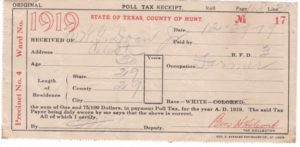Next Tuesday, March 6, is Primary Election Day in Texas. After months of finger pointing, name calling, negative ads and general disorder on social media and television, Texans will get to vote on the persons they want to run in the General Election on November 6. It will be the time to narrow the race down to two candidates, one for each party, in the final race.
Every person who registered to vote this year can go to their polling place and cast a ballot. But lots of changes have occurred in Texas voting laws since 1900. Then it was only in cities of 10,000 or more where voters had to register. Everyone else just walked in cast their ballot, visited with other voters and went home. All saloons and bars were closed that day, either for the election or because area was already dry.
In 1905 the A. W. Terrell Election Laws went into effect after Governor S. W. T. Lanham refused to sign the bill or return it. Who could not vote as a result of the new law? Any male under the age of twenty-one, idiots and lunatics, paupers supported by the county, persons convicted of felony unless pardoned or restored to full citizenship with the right of suffrage, and all members of the U. S. military, soldiers, sailors, and marines. At that time, women were not allowed to share the privilege of suffrage. It would not be until 1918 that women in Texas could vote; a year before females throughout many other states.
To vote, one must of course be a male, and a citizen of the state, county and precinct if he filed intention to vote one year before the election. The would-be voter must have paid his poll tax and have the receipt with him as proof. Poll tax exemptions were issued to those over the age of 60, or men blind or deaf or dumb, or persons permanently disabled or anyone with the loss of one hand or one foot. Voters were allowed to have someone to read the ballot to them but not advise whom to vote for.
Texas, like many of the former Confederate states, developed a systematic disenfranchisement of blacks, Native Americans, Latinos, and poor whites after the Civil War. They blatantly denied those minorities representation in government by ignoring the 13th, 14th, and 15th Amendments known as the Civil War Amendments. The 15th Amendment guaranteed the right to vote to all U. S. citizens became the one-issue Southern states could not tolerate. They enacted Jim Crow laws designed to restrict or prevent African American voter participation. It should be noted that at the time of Civil War Amendments, Native Americans did not have American citizenship.
Texas suppressed black voting using poll taxes and white primaries. To vote, one had to pay an additional out-of-pocket expense of $1.25 to $1.75 after 1902. While not much in today’s economy, it was a month’s worth of groceries for the poor at the time.
White primaries were used solely in Texas. The prevalent political party, Democrats, claimed to be a private club whose membership was restricted to men of Anglo heritage. The white primary election became law in 1923; everyone could vote in the general election, though. Numerous legal challenges to repeal the law failed until 1944 when the U. S. Supreme Court finally prohibited the white primary in the Smith v. Allwright.
Prior to 1944 the fourth Saturday of July every two years was “Primary Election Day.” With only one prevalent party, the Democrats won the primary or a run-off if required. Important local elections were settled in the summer leaving the November election for president and vice-president. Minorities could vote in November since it was a federal election. However, they had no representation locally.

